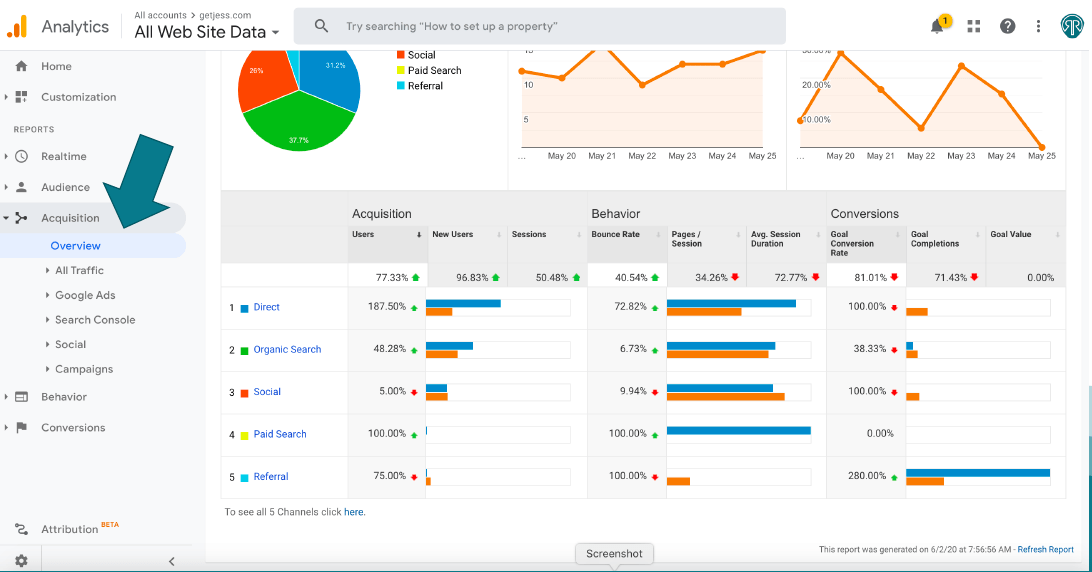Master Website Insights With Accurate Google Analytics Monitoring Code
The effective application of Google Analytics hinges on the precise execution of its monitoring code, a fundamental action typically overlooked by internet site owners. What are the usual challenges that could threaten your monitoring efforts, and just how can you guarantee precision in your method?
Recognizing Google Analytics Fundamentals
Google Analytics is an essential device for website owners and online marketers, giving indispensable understandings into customer behavior and web site efficiency. At its core, Google Analytics collects data concerning visitors to a web site, allowing individuals to evaluate metrics such as web traffic resources, customer engagement, and conversion prices. Recognizing these principles is important for maximizing a site's efficiency and boosting user experience.
The platform utilizes cookies to track interactions, videotaping information such as page views, session durations, and bounce rates. This info is accumulated and provided via personalized control panels, enabling users to imagine patterns gradually. Trick efficiency indications (KPIs) can be monitored, such as the total variety of users, brand-new versus returning visitors, and the geographical circulation of the target market.
Moreover, Google Analytics offers segmentation features, enabling customers to separate specific web traffic sources or customer demographics for even more targeted evaluation. By mastering these foundational aspects, web site proprietors can make enlightened decisions concerning content technique, advertising and marketing projects, and total site enhancements. Inevitably, comprehending Google Analytics basics is essential for leveraging data to drive growth and achieve business purposes properly.
Establishing Your Tracking Code

Copy the offered tracking code and paste it right into the HTML of your web site. Ideally, this code must be positioned in the header area of every page you desire to track. This guarantees that the tracking code loads prior to any type of various other content, permitting it to record data accurately. If you are using a material monitoring system (CMS) like WordPress, there are plugins readily available that simplify the integration procedure.
After installation, verify that the tracking code is working properly by making use of Google Tag Assistant or the Real-Time records in Google Analytics - when does the google analytics tracking code send an event hit to analytics?. This action is necessary to confirm that your data collection is precise and active, setting the structure for insightful analysis
Usual Tracking Code Issues
This may take place when the monitoring code is positioned in the incorrect section of the web site's HTML, usually leading to incomplete or missing information. In addition, having multiple instances of the tracking code on a single page can result in filled with air metrics, as customer communications might be counted more than when.
One more concern arises from using advertisement blockers, which can avoid the monitoring code from performing entirely, therefore skewing data. when does the google analytics tracking code send an event hit to analytics?. Additionally, failing to set up filters correctly can result in the exemption of necessary web traffic resources or the inclusion of unwanted referral spam, distorting the data collected
Website owners may also overlook the importance of tracking code updates, specifically when migrating to Google Analytics 4 (GA4) from Universal Analytics. Lastly, not enough testing before launching adjustments can result in undiscovered errors in the monitoring code, better making complex data integrity. Dealing with these common issues is vital for ensuring additional reading precise monitoring and insightful analytics.
Analyzing Web Site Information Effectively
Accurate data collection is only the initial step in leveraging Google Analytics; the genuine worth depends on properly analyzing that data to drive informed decision-making. To accomplish this, it is necessary to identify key efficiency signs (KPIs) that straighten with your organization objectives. Concentrate on metrics such as conversion rates, user involvement, and website traffic resources, as these will offer insights into user actions and the overall efficiency of your website.
Making Use Of Google Analytics' segmentation attributes allows for a much deeper understanding of your audience. By damaging down information into details demographics, habits, and website traffic channels, you can reveal trends and patterns that educate targeted approaches. Carrying out custom-made reports and control panels can enhance this procedure, allowing fast access to relevant information.
Furthermore, consistently evaluating information trends gradually helps to determine abnormalities and possibilities for enhancement. Make use of visualization tools to present information in an easily absorbable format, assisting in much more reliable communication with stakeholders. Inevitably, the capacity to evaluate web site data properly equips businesses to make strategic choices that enhance customer experience, optimize advertising and marketing efforts, and drive development.

Finest Practices for Accurate Tracking
Executing efficient tracking methods is important you could look here for acquiring trustworthy data in Google Analytics. To make certain precise monitoring, begin by correctly setting up the Google Analytics tracking code on every web page of your site. This can be completed with a tag supervisor or by directly installing the code right into the HTML.
Following, configure your Google Analytics account to leave out internal web traffic. This can be done by setting up filters that determine and get rid of visits from your organization's IP address, consequently preventing skewed data. Furthermore, make pop over to this web-site use of event tracking to check specific individual communications, such as downloads or video clip plays, which conventional page views might overlook.
Consistently investigate your monitoring arrangement to verify that all features, such as goals and ecommerce tracking, are functioning appropriately. Develop a constant identifying convention for your occasions and projects to facilitate simpler reporting and analysis.
Finally, take into consideration leveraging UTM parameters for campaigns to get insights into the efficiency of various advertising initiatives. By adhering to these best methods, you can improve the accuracy of your data collection and analysis, ultimately bring about even more enlightened decision-making for your web site.
Verdict
By guaranteeing the tracking code is appropriately positioned and regularly audited, website owners can capture important individual interaction data, thus helping with the recognition of vital efficiency indicators. Ultimately, a durable tracking framework boosts the capacity to drive engagement and improve total internet site efficiency.

Inadequate testing before launching modifications can result in unseen errors in the tracking code, further complicating data dependability.Applying reliable monitoring techniques is critical for obtaining trusted data in Google Analytics. By ensuring the monitoring code is appropriately positioned and consistently investigated, web site owners can record crucial user communication information, thus facilitating the recognition of essential performance indications.